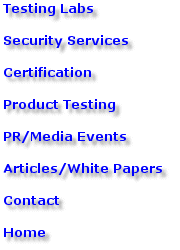|
Spotlight
on Internet Security
29/30 November 2001,
Rome
Grand Hotel Plaza, Via Del Corso 126, 00186
Rome, Italy
|

|

|
Agenda
| Thursday
29th November |
| 10:00 onwards |
Welcome desk open for registration |
| 1:00 pm |
Welcome drinks & lunch |
| 2:30-2:35 pm |
Welcome &
Introduction, NetEvents, |
| 2:35-3:05 pm |
Round Table 1 -
"Combating the DDOS Attack"
Chaired by the NSS Group
With Distributed Denial of
Service (DDOS) attacks on the increase, it is becoming more and
more difficult to protect against them. And the victims are
twofold - the target of the attack obviously suffers, but those
machines that are used as "zombies" are also affected.
Who is to blame? The user, for
allowing a zombie to be installed? The security administrator, for
not preventing such incursions at the network perimeter? Or the
ISP, for not filtering traffic effectively before it gets to our
gateway? What can the ISP do once a DDOS attack has swamped our
bandwidth? Could ISPs be more proactive in stopping DDOS attacks
altogether?
Or perhaps the ISP would maintain
that it is entirely our responsibility. In which case, how
effective are perimeter firewalls, personal firewalls, anti virus
mechanisms and Intrusion Detection Systems at protecting us
against full-blown attacks, or the insertion of zombies onto our
networks?
|
| 3:05-3:35 pm |
Round Table II
- "Battle of the Virtual Private Networks"
Chaired by Michael Howard, Founder and Principal Analyst,
Infonetics Research, Inc.
It's like two freight trains
heading for each other at top speed. IPsec has been the protocol
of choice for virtual private networking, guaranteeing
cryptographic authentication of each end of the VPN tunnel to each
other, as well as encrypting the data traffic so that spies can't
tap into or spoof critical business data. But then comes along
MPLS, or Multi Protocol Label Switching, which brings ATM-like
quality of service and circuit-based routing to the carrier
networks and, someday, perhaps to the public Internet. MPLS may
not have built-in encryption and authentication methods, but it
does have the advantage of robust traffic engineering, genuine
quality of service, and the ability to turn a non-deterministic IP
network into the model of efficiency and reliability. MPLS,
heavily promoted by router vendors like Juniper and Cisco, is
tailor made for helping carriers provision VPNs. But what about
companies like CheckPoint, Avaya, Alcatel, and others, who have
been successfully selling their IPsec-based VPN gear into
enterprises and carriers? They're arguing that MPLS isn't secure
enough, and that everyone should stick with the tried-and-true
IPsec technology. The carriers are caught in the middle, and
customers are confused. We'll dig down and discover the truth.
|
| 3:35-3:55 pm |
Coffee break |
| 3:55-4:25 pm |
Round Table
III - "Wire Speed Security"
Chaired by the NSS Group
Networks are getting faster, yet
some security products seem rooted in the days of 10Mbit Ethernet.
Whilst such products are fine when all they have to address is a
slow Internet connection, they must also be able to handle 100Mbit
or even 1000Mbit LANs when installed on an intranet.
How much of a problem is a
firewall that only has 100Mbit throughput when installed on a
Gigabit backbone? How effective is an IDS that cannot handle a
heavily loaded Fast Ethernet segment? Does it matter if packets
are dropped, attacks are missed? Is it possible to perform true
wire-speed analysis up to Gigabit speeds or should we always bank
on having to install multiple IDS engines to cope with such
situations?
The NSS Group will present the
findings of its latest IDS Group Test, where intrusion detection
products were put through their paces on heavily loaded high speed
networks.
|
| 4:25-4:55 pm |
Round Table IV
- "Mobile/Wireless Security Issues"
Chaired by the NSS Group
The whole world is going
wireless, it seems. But what is the effect on security? The mobile
user has always presented a challenge to the security
administrator, but just as we get to grips with securing remote
connections from a few laptops to head office, along comes the
Internet-enabled PDA. And, of course, the smart phone.
Now everyone wants access from
their own hand-held device. What sort of management and security
challenges does this present? How easy is it to hack into our PDAs?
Does the "always on" nature of the next generation
mobile phones present a hacker with an easy route into our
corporate data? Is Bluetooth a hacker's dream? How soon will we
need firewalls and AV scanners on our mobile phones? And how
quickly can the software vendors oblige?
|
| 4:55-5:55 pm |
Afternoon tea and Press 'Open
Meeting' session. |
| 7:00 pm |
Pre-dinner cocktail reception
|
| 7:15 pm |
Dinner |
| Friday
30th November |
| 7:30-8:30 am |
Breakfast 'Open Meetings' |
| 8:30-10:20 am |
Three individually scheduled
press briefing sessions for each vendor |
| 10:20-10:40 am |
Coffee break |
| 10:40-12:40 pm |
Final three scheduled
one-to-one press briefing sessions with vendors |
| 12:40 pm |
Lunch |
| 2:00 pm |
Close of Internet Security Press
Spotlight |
Click here to view Past Events
|


